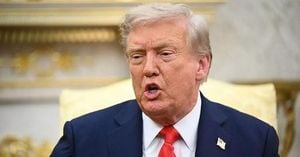Colombia is once again grappling with the aftermath of political violence, as thousands mourn the loss of Miguel Uribe Turbay, the 39-year-old senator and presidential hopeful who died on Monday, August 11, 2025, more than two months after being shot at a campaign rally in Bogota. The shooting, which occurred on June 7, 2025, during a speech in a working-class neighborhood, has not only claimed the life of a prominent opposition figure but also reopened old wounds in a country still searching for lasting peace.
Uribe’s death sent shockwaves through Colombia’s political landscape. According to AP News, his coffin, draped in the national flag, was carried on foot from Congress to the Primate Cathedral of Colombia, a solemn procession watched by family, friends, members of Congress, and a U.S. government delegation. His wife, María Claudia Tarazona, and their four-year-old son accompanied the coffin, their grief palpable in the midst of a nation’s sorrow.
“To break up a family—to take a father’s son, a wife’s husband, a children’s father—is the greatest act of evil that can exist,” Tarazona said during the Eucharist, as reported by AP News. The hearse then continued through the streets of Bogota to the city’s Central Cemetery, the final resting place of other political figures felled by violence, including Liberal leader Luis Carlos Galán.
Uribe’s assassination has drawn comparisons to the darkest days of Colombia’s past. The attack, caught on multiple videos, alarmed Colombians who have not witnessed this kind of political violence against presidential candidates since the 1990s, when Medellin drug lord Pablo Escobar declared war on the state. The tragedy is deeply personal for Uribe’s family: his mother, renowned journalist Diana Turbay, was killed during a police rescue after being kidnapped by Escobar’s associates, a chilling echo of the violence that haunted an earlier generation.
In a poignant interview last year, Uribe reflected on his mother’s sacrifice. “If my mother was willing to give her life for a cause, how could I not do the same in life and in politics?” he told a Colombian news outlet, as cited by AP News. Uribe was just five years old when his mother died, a loss that would shape his life and career.
Uribe’s path to national prominence began early. A lawyer with a master’s degree in public administration from Harvard University, he entered politics as a Bogota councilman at the age of 26. In 2022, he became the top vote-getter in the conservative Democratic Center party, which is led by former President Álvaro Uribe (no relation). By October 2024, he had announced his candidacy for the May 2026 presidential elections, positioning himself as a leading critic of President Gustavo Petro’s leftist government.
Tragically, Uribe’s presidential ambitions were cut short. On June 7, 2025, as he addressed supporters in a local park, he was shot three times—twice in the head. He was rushed to a hospital in Bogota, where he remained in intensive care for more than two months, experiencing brief episodes of improvement but never regaining full consciousness. Authorities quickly arrested a teenage suspect at the scene and later detained five others, but the motive behind the attack and who ultimately ordered it remain a mystery.
“The bullets that took his life not only broke the hearts of his family, they reopened the fractures of a country that has yet to find peace,” Senate President Lidio García said during the funeral proceedings, according to AP News. The sense of national trauma was evident as tens of thousands of Colombians, dressed in white and waving flags, took to the streets to denounce the violence in the days following the attack.
The shooting has prompted urgent calls for justice and greater protection for political figures. President Gustavo Petro expressed his condolences on social media, stating, “The government must repudiate the crime and help. Regardless of ideology, the person and their family, their life and safety, are the government’s priority. We have not persecuted any member of the opposition, nor will we.” Petro and Vice President Francia Márquez did not attend Uribe’s funeral, honoring the family’s wishes to keep the ceremony free from political overtones. “We are not going not because we do not want to, we simply respect the family and avoid that the funeral of Senator Miguel Uribe is taken over by supporters of hate,” Petro posted on X.
International voices also joined the chorus of mourning. U.S. Secretary of State Marco Rubio stated, “The United States stands in solidarity with his family, the Colombian people, both in mourning and demanding justice for those responsible.” According to AP News, a delegation of U.S. officials attended the funeral, underscoring the global significance of the tragedy.
Within Colombia, reactions have spanned the political spectrum. Former President Álvaro Uribe, leader of the Democratic Center party, condemned the killing, saying, “Evil destroys everything. They have killed hope. May Miguel’s struggle be a light that illuminates Colombia’s path.” Allies of the slain candidate have criticized the government for allegedly ignoring repeated requests to reinforce his state-provided security detail, while authorities have floated several hypotheses about the attack’s origins but offered no definitive answers.
The impact of Uribe’s death on Colombia’s political future is still uncertain. Javier Garay, a political science professor at Externado University of Colombia, told AP News that Uribe “has already become a symbol of the Colombian right.” Still, Garay cautioned that it is too soon to predict whether the senator’s death will galvanize the conservative bloc, given the current lack of unity and the diverse field of candidates vying for leadership in the 2026 elections.
The government has responded by strengthening security measures for all opposition politicians and presidential hopefuls, with some candidates canceling rallies out of fear for their safety. The specter of violence looms over the upcoming election season, raising difficult questions about the health of Colombia’s democracy and the risks faced by those who dare to challenge the status quo.
For now, Colombia mourns a leader whose life was shaped by both personal tragedy and public service. As his coffin came to rest alongside other martyrs of the nation’s turbulent history, the words of his wife, María Claudia Tarazona, resonated with many: “Rest in peace, love of my life. I will take care of our children. I ask God to show me the way to learn to live without you.”
Uribe’s passing has left a void in Colombian politics and a country once again wrestling with the consequences of violence. The coming months will reveal whether his legacy inspires unity or deepens the divisions he sought to heal.






